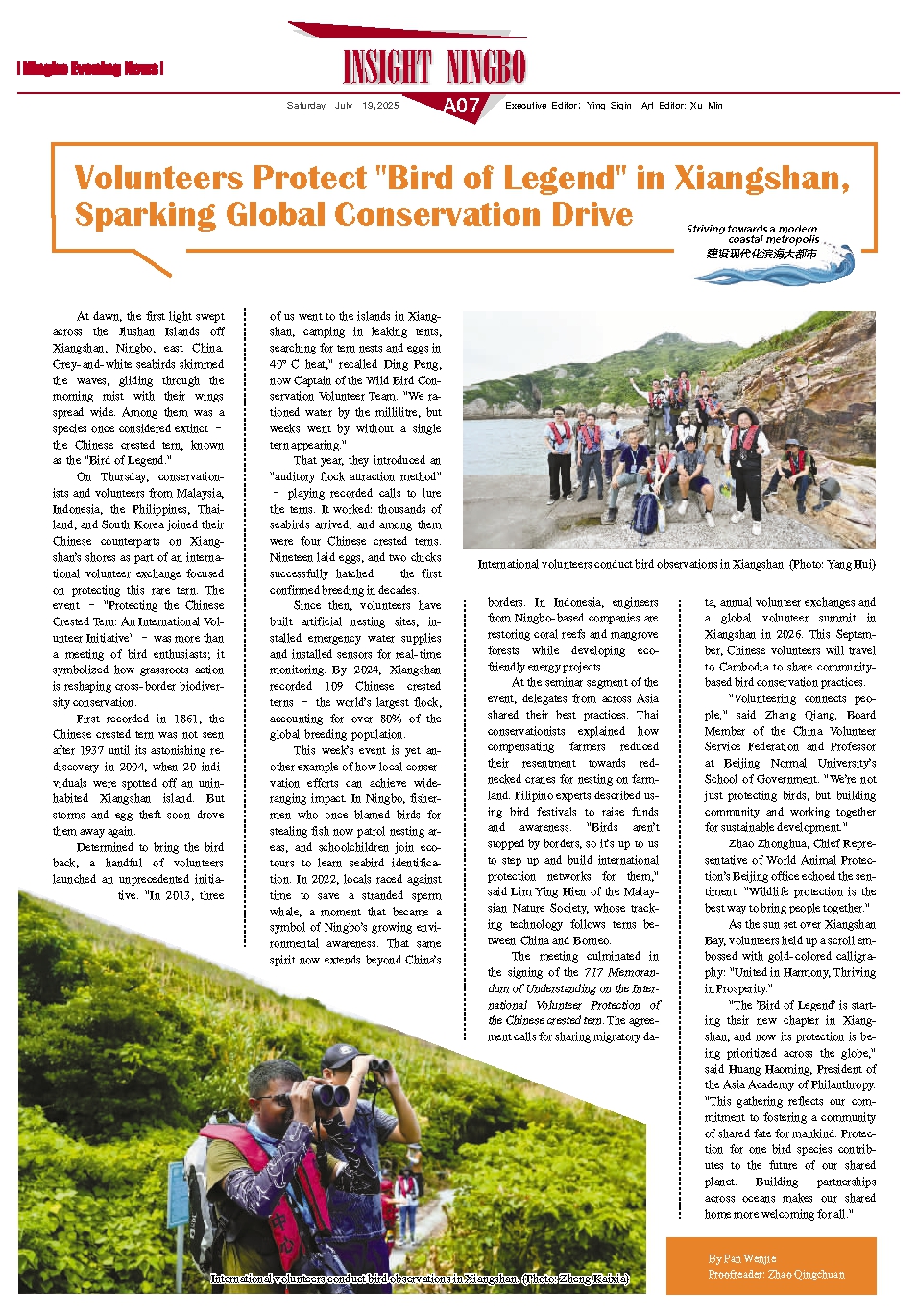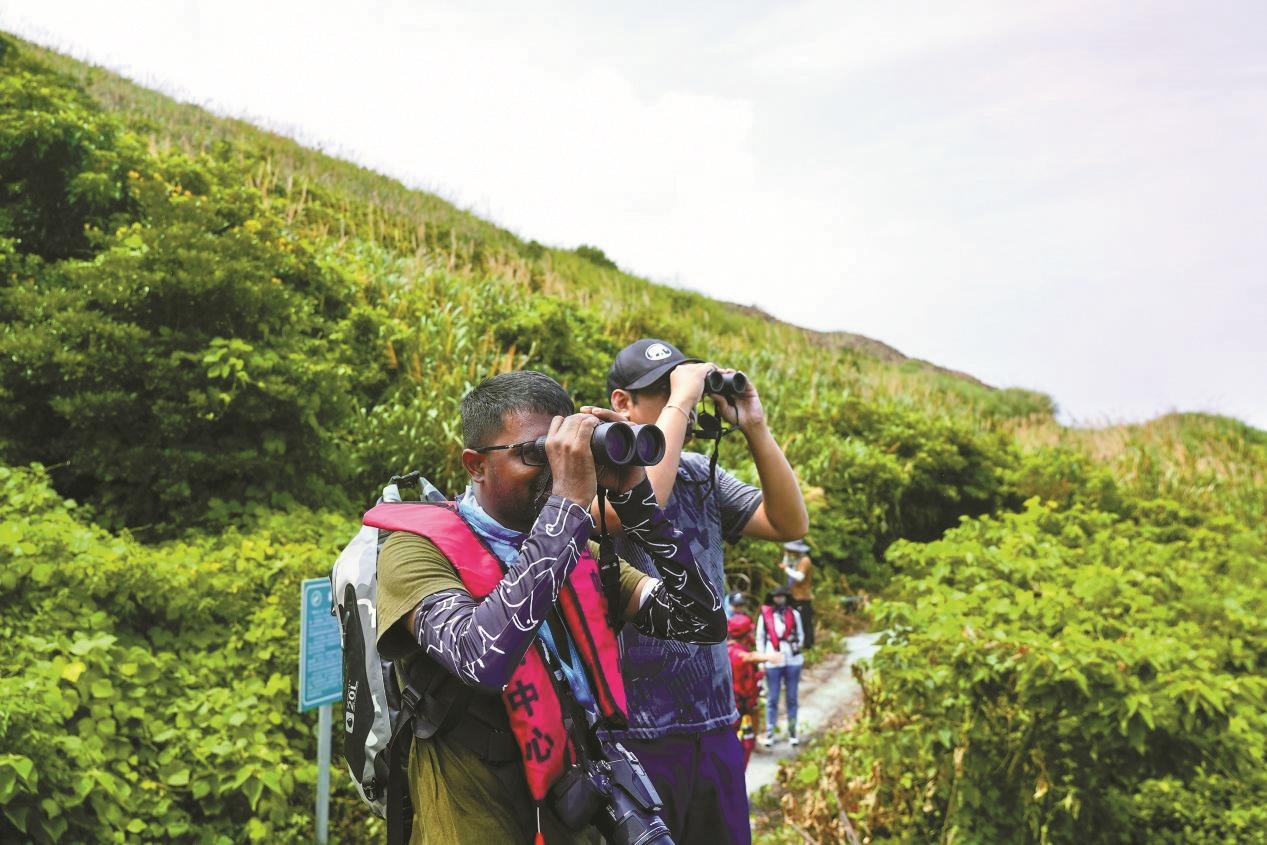At dawn, the first light swept across the Jiushan Islands off Xiangshan, Ningbo, east China. Grey-and-white seabirds skimmed the waves, gliding through the morning mist with their wings spread wide. Among them was a species once considered extinct – the Chinese crested tern, known as the "Bird of Legend."
On Thursday, conservationists and volunteers from Malaysia, Indonesia, the Philippines, Thailand, and South Korea joined their Chinese counterparts on Xiangshan's shores as part of an international volunteer exchange focused on protecting this rare tern. The event – "Protecting the Chinese Crested Tern: An International Volunteer Initiative" – was more than a meeting of bird enthusiasts; it symbolized how grassroots action is reshaping cross-border biodiversity conservation.
First recorded in 1861, the Chinese crested tern was not seen after 1937 until its astonishing rediscovery in 2004, when 20 individuals were spotted off an uninhabited Xiangshan island. But storms and egg theft soon drove them away again.
Determined to bring the bird back, a handful of volunteers launched an unprecedented initiative. "In 2013, three of us went to the islands in Xiangshan, camping in leaking tents, searching for tern nests and eggs in 40°C heat," recalled Ding Peng, now Captain of the Wild Bird Conservation Volunteer Team. "We rationed water by the millilitre, but weeks went by without a single tern appearing."
That year, they introduced an "auditory flock attraction method" – playing recorded calls to lure the terns. It worked: thousands of seabirds arrived, and among them were four Chinese crested terns. Nineteen laid eggs, and two chicks successfully hatched – the first confirmed breeding in decades.
Since then, volunteers have built artificial nesting sites, installed emergency water supplies and installed sensors for real-time monitoring. By 2024, Xiangshan recorded 109 Chinese crested terns – the world's largest flock, accounting for over 80% of the global breeding population.
This week's event is yet another example of how local conservation efforts can achieve wide-ranging impact. In Ningbo, fishermen who once blamed birds for stealing fish now patrol nesting areas, and schoolchildren join eco-tours to learn seabird identification. In 2022, locals raced against time to save a stranded sperm whale, a moment that became a symbol of Ningbo's growing environmental awareness. That same spirit now extends beyond China's borders. In Indonesia, engineers from Ningbo-based companies are restoring coral reefs and mangrove forests while developing eco-friendly energy projects.
At the seminar segment of the event, delegates from across Asia shared their best practices. Thai conservationists explained how compensating farmers reduced their resentment towards red-necked cranes for nesting on farmland. Filipino experts described using bird festivals to raise funds and awareness. "Birds aren't stopped by borders, so it's up to us to step up and build international protection networks for them," said Lim Ying Hien of the Malaysian Nature Society, whose tracking technology follows terns between China and Borneo.
The meeting culminated in the signing of the 717 Memorandum of Understanding on the International Volunteer Protection of the Chinese crested tern. The agreement calls for sharing migratory data, annual volunteer exchanges and a global volunteer summit in Xiangshan in 2026. This September, Chinese volunteers will travel to Cambodia to share community-based bird conservation practices.
"Volunteering connects people," said Zhang Qiang, Board Member of the China Volunteer Service Federation and Professor at Beijing Normal University's School of Government. "We're not just protecting birds, but building community and working together for sustainable development."
Zhao Zhonghua, Chief Representative of World Animal Protection's Beijing office echoed the sentiment: "Wildlife protection is the best way to bring people together."
As the sun set over Xiangshan Bay, volunteers held up a scroll embossed with gold-colored calligraphy: "United in Harmony, Thriving in Prosperity."
"The 'Bird of Legend' is starting their new chapter in Xiangshan, and now its protection is being prioritized across the globe," said Huang Haoming, President of the Asia Academy of Philanthropy. "This gathering reflects our commitment to fostering a community of shared fate for mankind. Protection for one bird species contributes to the future of our shared planet. Building partnerships across oceans makes our shared home more welcoming for all."
By Pan Wenjie
Proofreader: Zhao Qingchuan




